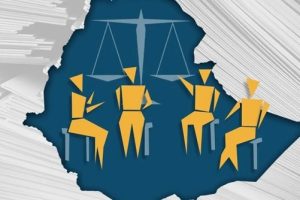Africa’s place in the global order is undergoing a crucial test, driven by the rapidly changing trends shaping the 21st century. Whether in terms of climate change, the evolution of technology, or shifts in geopolitical power, the global environment is in flux.
At the heart of this transformation lies a key question for the continent: will Africa merely observe the changes and react belatedly, or will it take charge of its destiny with deliberate and informed decisions? This was the central challenge posed by Ethiopia’s Minister of Education, Professor Berhanu Nega, at the closing ceremony of the Innovation Africa 2025 Summit. His message was unambiguous—Africa must act with intentionality, foresight, and unity to avoid being left behind or worse, consumed by the forces reshaping the modern world.
Professor Berhanu’s remarks underscored the urgency of the moment. Africa stands at a crossroads, and the path it chooses will have far-reaching consequences for its future. The minister asked, “Are we Africans going to continue down the same path as in the past, or will we confront this emerging world with intentionality?” This question challenges Africa’s leaders, educators, innovators, and citizens to rethink conventional strategies and embrace a mindset that is responsive to the currents of global change. Failing to do so, he warned, could result not just in marginalization, but in being overwhelmed by the pace and scale of transformation occurring elsewhere.
Central to Africa’s response is its ability to grapple with three interlinked global crises: climate change, technological disruption, and an evolving world order. Each of these areas presents both risks and opportunities. Climate change, for example, disproportionately affects African nations due to their limited adaptive capacities, fragile ecosystems, and reliance on climate-sensitive sectors such as agriculture. However, the continent also holds vast potential in renewable energy and sustainable agriculture, offering a chance to lead by example in green innovation. Likewise, the technological revolution sweeping the globe could widen the gap between developed and developing regions—but it also presents Africa with a unique opportunity to leapfrog older infrastructure models and embrace digital solutions across sectors including finance, education, healthcare, and governance.
Professor Berhanu stressed that for Africa to remain relevant and resilient, it must not only acknowledge these shifts but also strategically engage with them. He warned that without a clear and intentional direction, the continent risks continuing on a path that keeps it perpetually behind. This sense of purpose, or intentionality as he called it, must come from within and must be based on a shared understanding of where Africa wants to go. The professor emphasized that inaction or complacency is no longer viable. The future demands that Africa approach development, education, and governance with an evolved framework—one informed by knowledge, driven by innovation, and guided by inclusive vision.
Drawing from Ethiopia’s own experience, Professor Berhanu highlighted how his country has embraced this imperative by undertaking significant reforms in its education sector. These reforms are designed not only to modernize the system but also to align it with the dynamic requirements of the global knowledge economy. In his view, education plays a foundational role in Africa’s ability to adapt and thrive. He stated that Ethiopia’s development trajectory is rooted in an awareness of global trends—not only in terms of geopolitics and power realignments but also in terms of how knowledge is produced, distributed, and applied.
He articulated a vision where education serves as a bridge between current challenges and future possibilities. Ethiopia, he said, has restructured its education system to better reflect students’ capacities and realities. This includes aligning assessment methods with children’s abilities, revamping the curriculum, and improving school infrastructure to create learning environments that support critical thinking and innovation. These changes are not isolated efforts but part of a broader recognition that education must be the bedrock of sustainable development in a knowledge-driven world.
The Innovation Africa 2025 Summit, which took place over three days in Addis Ababa, brought together leaders, educators, policymakers, and innovators from across the continent and beyond. The summit provided a critical platform to discuss national strategies for improving the quality of education, developing 21st-century skills, training teachers, building institutional capacity, and integrating digital technologies into learning. These discussions were not academic exercises but real engagements with the pressing challenges and opportunities facing African societies today.
What emerged from the summit was a clear consensus: Africa cannot afford to maintain outdated models of education, economic planning, or technological adoption. Rather, it must evolve swiftly and strategically. The global landscape is moving at a pace defined by rapid innovation, shifting power blocs, and complex challenges such as pandemics and climate-induced migration. Africa’s dynamism lies in its ability to anticipate, respond to, and influence these trends—not passively, but proactively.
There is already evidence that parts of the continent are rising to this challenge. Across Africa, a digital revolution is underway. From fintech platforms transforming mobile payments in Kenya and Nigeria, to EdTech startups reshaping access to education in South Africa and Rwanda, to healthtech and agritech innovations across East and West Africa, the signs of transformation are clear. However, the question remains whether such changes are occurring fast enough and at scale to shift the overall trajectory of the continent.
Africa’s youthful population is often cited as one of its greatest assets. With more than 60% of the population under the age of 25, the continent has a demographic edge that, if properly harnessed, could fuel decades of growth. But that demographic dividend will only be realized if young Africans are equipped with the education, skills, and opportunities to participate meaningfully in the global economy. That is why the reforms Professor Berhanu outlined are not just relevant for Ethiopia—they are a model for other African nations seeking to transform their education systems into engines of growth and resilience.
Beyond education and technology, Africa must also take a proactive role in shaping the global governance structures that are now being recalibrated. As new geopolitical alliances form and traditional powers realign, Africa must assert its voice in forums where rules are being rewritten—whether in climate negotiations, global trade talks, or debates about digital governance. To do so credibly, African countries must not only be united but also demonstrate leadership at home through good governance, inclusive development, and strategic investment.
Ultimately, the story of Africa’s engagement with global trends is one of possibility. While the challenges are undeniable, the continent has the potential to chart a new path—one that is informed by history but not constrained by it. Professor Berhanu’s message is a clarion call to African leaders, citizens, and partners: the future will not wait. The time to act is now. Africa’s dynamism must not be a matter of rhetoric, but of reality, embodied in policies, institutions, and mindsets that reflect the urgency and complexity of our times.
As the Innovation Africa 2025 Summit concluded, the spirit of intentionality that Professor Berhanu championed resonated strongly. It is a spirit rooted in self-awareness, guided by knowledge, and animated by a vision of a future where Africa not only adapts to global change but helps shape it. The world is changing—and with courage, clarity, and collaboration, Africa can rise not just as a participant, but as a global leader.
BY DANIEL ALEMAYEHU
THE ETHIOPIAN HERALD TUESDAY 6 MAY 2025



